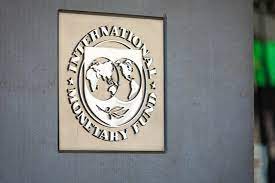IMF expects UK economy to avoid recession

London: The UK economy is expected to avoid a recession this year, the International Monetary Fund has said, after it sharply upgraded its growth forecast.
It now expects the UK to grow by 0.4% in 2023, whereas last month it forecast the economy would contract by 0.3%.
Growth would be helped by “resilient demand” and falling energy prices.
But the IMF said inflation “remains stubbornly high” and that higher interest rates will need to remain in place if it is to be brought down.
Speaking in London, the IMF’s managing director Kristalina Georgieva said the upgraded growth figure had been sparked by falling energy prices, easing concerns over Brexit and improved financial stability.

She added that the government had taken “decisive and responsible steps in recent months”.
But Ms Georgieva also said now was not the time to look at cutting taxes, warning that at the moment “neither is it affordable, nor is it desirable”.
The IMF report noted that the risks for the UK economy were “considerable”, with the biggest danger coming from “greater-than-anticipated persistence in price- and wage-setting”, which would keep inflation higher for longer.
It also said the UK must address the record numbers of people not working, many of whom have long-term illnesses.
Chancellor Jeremy Hunt said the report “credits our action to restore stability and tame inflation”.
“If we stick to the plan, the IMF confirm our long-term growth prospects are stronger than in Germany, France and Italy.”
Pat McFadden, Labour’s shadow chief secretary to the Treasury, said the report revealed “the fragility of the UK economy, highlighting the slowdown in economic activity since last year and stubbornly high prices”.
The IMF said faster-than-usual pay growth and global supply chains returning to normal after the pandemic had also contributed to its growth upgrade. However, it noted that the outlook for growth “remains subdued”.
The IMF forecasts the economy will grow by 1% in 2024, rising to 2% in 2025 and 2026.
It also predicts that inflation will not return to the Bank of England’s target of 2% until mid-2025, which is later than it had forecast previously.
“Further monetary tightening will likely be needed,” the agency said, and interest rates “may have to remain high for longer to bring down inflation more assuredly”.
Earlier, Bank of England governor Andrew Bailey, told MPs on the Treasury Select Committee inflation had “turned the corner”.
However, he admitted that inflation is currently 0.8% higher than the Bank of England had expected in February, blaming the high price of food and goods like clothing and footwear as underlying reasons.
The Bank has put up interest rates 12 times in a row in an attempt to bring down inflation, but this has pushed up costs for many mortgage holders.
On interest rates, Mr Bailey said: “I can’t tell you whether we’re at the peak. I think we’re nearer to the peak than we were.”
With this IMF health check on the UK’s economic recovery, the chancellor gets some ammo in his battles with the opposition, inside and outside his party. The UK this year is no longer bottom of the G7 or G20 league tables.
The IMF also goes out of its way to praise UK progress, the Budget, and the response to banking pressures and the prime minister’s Northern Ireland Brexit deal.
The result is a punchy upgrade within just a few weeks from decline of 0.3% to growth of 0.4%.
To be clear, this is closer to zero than normal growth, and definitely not sunlit uplands. But it does also significantly exceed the worst recessionary forecasts from around the time of the mini-budget, and the series of global crises.
The IMF also helped the chancellor in his battles with the right of the party over both Brexit and tax cuts. The Windsor Framework has boosted investment confidence, it said, and the time and place for changes to tax and spend policy had not come.
But the IMF also deployed a new key phrase, warning against “premature celebration” on inflation.
Its managing director Kristalina Georgieva told me: “What is most concerning is food prices. Even with energy prices, trimming down, staying as high as it is, it does mean that interest rates will have to remain higher for longer. The discussion around interest rates has somewhat shifted from ‘how high?’ to ‘for how long?'”
That was a clear hint that expectations that interest rates could be expected to fall within a year may be off the mark.
Sticky inflation, and especially food price inflation, is the enduring concern.
The IMF works to stabilise the global economy and one of its key roles is to act as an early economic warning system.
Last year, the fund openly criticised the short-lived plans by the UK government, then led by Liz Truss, for tax cuts. It said the measures, which were unveiled in September’s mini-budget but quickly scrapped, were likely to fuel the cost of living crisis.
One of the criticisms of the mini-budget was that there was no analysis from the government’s independent forecasting body, the Office for Budget Responsibility (OBR).
In its latest forecast, the IMF recommended that all major fiscal policy changes should be accompanied by OBR forecasts.





